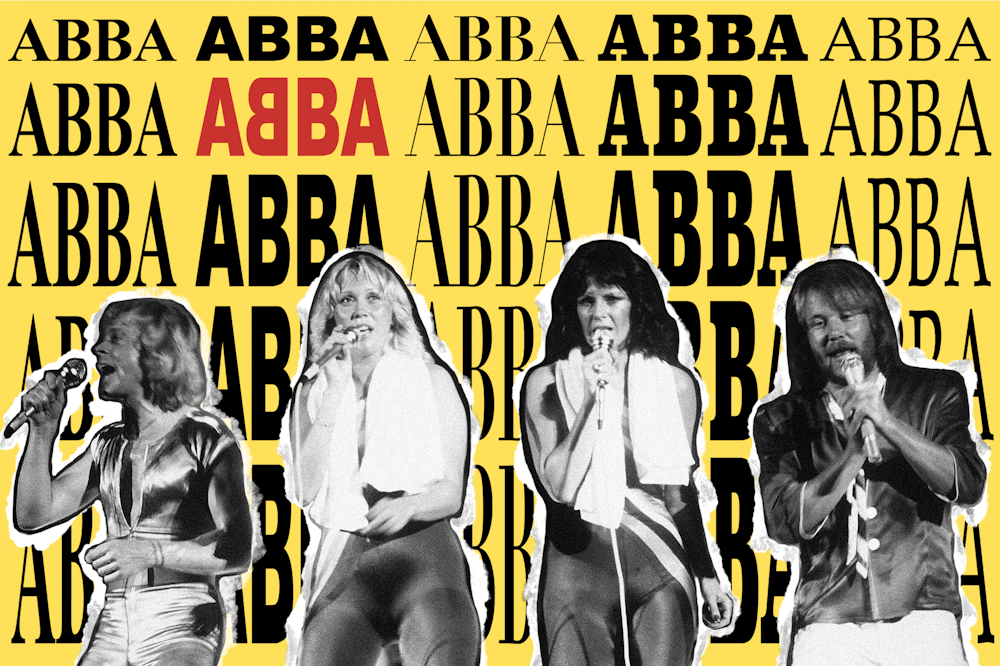Back in June, TikTok was swept with clips of people crawling up beaches reenacting Amanda Seyfried’s Mamma Mia! beach scene to the tune of “Lay All Your Love on Me.” Then in July, Netflix’s Will Ferrell–led blockbuster Eurovision: The Story of Fire Saga featured prominently ABBA’s 1974 rise to stardom with “Waterloo” through the Eurovision Song Contest. These days, it feels like ABBA is everywhere — or maybe it’s always been that way.
ABBA's music continues to be the popular backdrop for numerous popular TikTok trends, from lip syncing scenes from the Mamma Mia! franchise to a viral high–energy “Gimme! Gimme! Gimme! (A Man After Midnight)” dance. And with promises of new music, a prospective hologram tour, and whispers of a Mamma Mia! 3, it doesn’t seem that we’re going to be getting “Dancing Queen” out of our heads anytime soon. So, what is it about the Swedish pop–disco supergroup that keeps them so relevant in 2020?
ABBA stands apart from other ascendant musical groups of the 70s and 80s for several reasons. They first rose to fame in Europe after winning the Eurovision Song Contest and gained notoriety mostly in Europe with hits like “SOS” and “Knowing Me, Knowing You.” In fact, they didn’t gain major acclaim in the US until the early ‘90s with the release of ABBA Gold, a collection of the band’s greatest hits, years after the group had already split. The band was given a further boost when Mamma Mia!, a jukebox musical based on some of ABBA’s most–loved songs, opened on Broadway in 2001. By 2008, ABBA was completely solidified in American pop culture with Meryl Streep’s starring role in the musical’s film adaptation.
But it isn’t just ABBA’s slow–burn into the American musical landscape that sets them apart from the other greats of their generation. Unlike the mostly male–dominated musical groups that have become Rock and Roll Hall of Fame staples, ABBA lacks the cool–guy psychedelic allure, heartthrob guitarists, or eccentric powerhouse frontman. The band also leans heavily on metallic vocals rather than rock ballads and embraces its distinctly European origins by incorporating foreign languages into some of their biggest hits like “Voulez-Vous,” “Andante, Andante,” and “Hasta Mañana,” which made them truly global artists. ABBA inhabits a musical space all its own, embodying a careful balance of lust and authenticity that’s difficult to recreate. Despite their bright, poppy sound, their fidelity to their Swedish folk roots gives ABBA a certain comforting feel that is unparalleled by any other groups with their same global prowess. There’s something magically transcendent about the dreamy soundscapes of ABBA’s music that makes it so timeless—and somehow still ever–popular.
Maybe ABBA’s sustained relevance in American pop culture lies in the tender ease of their spectacle—today, we’re seeing the same kind of homegrown stardom flourish on TikTok, the app that is also continuing to promote ABBA to a whole new generation. In many ways, ABBA’s success is a near–perfect reflection of the TikTok stars of today—a healthy mix of care–free vibing and carefully choreographed, over-the-top editing and aestheticizing. TikTok is most known for its ability to take young people and transform them into overnight celebrities. It’s a platform where anyone can go viral, which parallels ABBA’s rise to fame from small–town Swedish musical group to global superstars. Outrageous fashion and glittery matching jumpsuits? In 2020, ABBA’s iconic sparkled bell–bottomed jumpsuits feel less like a vintage dance club look and more like a semi-niche TikTok trend. It’s no wonder that the band has such appeal to the TikTok generation.
At the same time, it’s difficult to separate ABBA’s sustained popularity from the success of the Mamma Mia! franchise—and its largely female fan base. Not only is ABBA fronted by two women, but Mamma Mia! is female–led, female–directed, and female–written; it takes ABBA’s seductive melodies and bends them to center on the romantic escapades of a middle–aged woman, a mother–daughter narrative, and ride–or–die female friendships. So of course, in the land of Tiktok that is ruled by duets and teenage girls who love to dance, songs from the Mamma Mia! soundtrack perfectly compliment the care-free nature of the roller-skating, decades–inspired aesthetics of the 2020 social media landscape—and the young femmes who dominate it.
But maybe the enduring charm of ABBA goes beyond the aesthetic of the TikTok generation—maybe there’s something inexplicably enchanting about ABBA’s pop–disco that we all need these days to escape from our present reality. In the nostalgia of “Chiquitita” there is joy and repose; in the wistful longing of “The Name of the Game” there is loneliness and anticipation. There’s a certain contradictory sentiment to ABBA’s lyrical and melodic tone that feels strangely prescient to the current moment, while being mindless enough to provide a romantic musical escape. The upbeat major–minor oscillations make them the perfect backdrop for 70s–themed dance parties. Those smooth, metallic, subtly–accented vocals flicker from exciting urgency to soothing sweetness that makes every song a balance of electricity and warmth. There’s just something about the swingy groove of a cymbal–punctuated keyboard that makes it almost impossible not to sway and sing along.
ABBA is just the kind of comfort food music that we need to brighten the endless days seen mostly through computer screens—the songs we need to temporarily take us somewhere bright and dreamy. Maybe when the last thing we want to think about is politics or the ever–present pandemic, we just want to sing along to “Honey, Honey” and forget for a bit.







